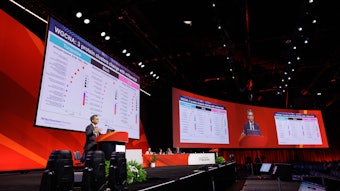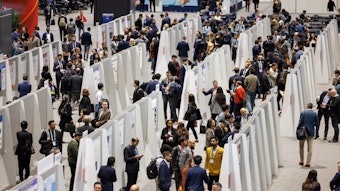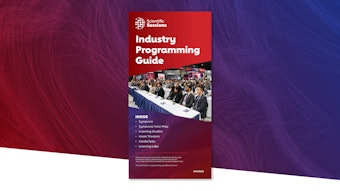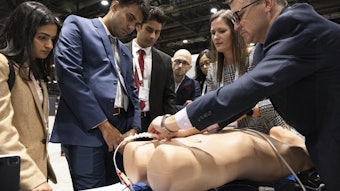Ablation, lifestyle changes may be better ways to manage atrial fibrillation, presenters say

It’s time to shift clinical management of atrial fibrillation to ablation and lifestyle changes, suggest presenters in Saturday’s “Atrial Fibrillation: Time for a Paradigm Shift in Management” session.
Revised AF guidelines recommend ablation as an alternative to medication and recent studies reveal it may become first-line treatment for some patients.
Meanwhile, early clinical work shows strong potential for lifestyle management to treat and possibly reverse structural damage caused by AF.
AFFIRM and other randomized studies consistently show similar survival benefits from rate and rhythm control strategies for AF in intention-to-treat analyses, said Andrea M. Russo, MD, professor of medicine and director of electrophysiology and arrhythmia services at Cooper Medical School of Rowan University in Camden, New Jersey.
But more recent results suggest that rhythm control plus ablation may be beneficial in some situations. Recent data also indicate that early ablation is preferred because it limits the atrial wall restructuring that can develop over time to worsen clinical outcomes in some patients.
The presence of heart failure complicates AF treatment, said Jennifer Wright, MD, associate professor of medicine at the University of Wisconsin School of Medicine and Public Health in Madison. Patients with HF and reduced ejection fraction (HFrEF) have no mortality benefit from rhythm-control medications. Catheter ablation reduces mortality and hospitalization for HFrEF patients with AF.
Ablation also appears to maintain ejection fraction in patients with HF and preserved ejection fraction (HFpEF), although more data are needed, Dr. Wright said.
“Catheter ablation is a game changer for management of our heart failure patients with AF,” she said.
Patients more likely to benefit from ablation include those with suspected AF-induced or mediated cardiomyopathy, NYHA Class I/II, no significant ventricular scar, paroxysmal or early persistent AF and those with no significant comorbidities, said Rakesh Gopinathannair, MD, professor of medicine at the University of Missouri and director of the Cardiac Electrophysiology Lab at the Kansas City Heart Rhythm Institute.
Patients with advanced HF and/or severe left ventricle dysfunction, significant ventricular scarring on MRI, severe atrial myopathy, longstanding persistent AF, prior failed ablation and advanced age or significant comorbidities are less favorable for ablation.
Randomized trials in HFrEF patients found about a 50% hazard ratio for mortality at five years following ablation compared to medication, Dr. Gopinathannair said. HFrEF likely induces or mediates occult AF cardiomyopathy that requires rhythm control, and ablation has better short- and long-term success than anti-arrhythmic medications. Ablation also avoids the adverse effects associated with long-term anti-arrhythmic medication, he said.
“Reducing the AF burden is the secret ingredient of ablation leading to improvement,” Dr. Gopinathannair said. “Even if catheter ablation cannot cure AF, it can significantly reduce the burden. And that’s what you need for good long-term outcomes. It is time for a shift in the paradigm. In eligible patients with AF and HFrEF, catheter ablation should be first-line therapy.”
Moving from medication to ablation may not be the final paradigm shift in AF, Gopinathannair said. Modifiable risk factors, including alcohol intake, diabetes, hypertension, obesity, physical inactivity, sleep apnea, dyslipidemia and smoking, lead to mechanistic changes that favor AF despite ablation or other treatment.
Prashanthan Sanders, MD, director of the Center for Heart Rhythm Disorders at the University of Adelaide in Australia, suggests altering the phenotype of AF through lifestyle management strategies to reduce the burden of AF and reverse disease progression.











